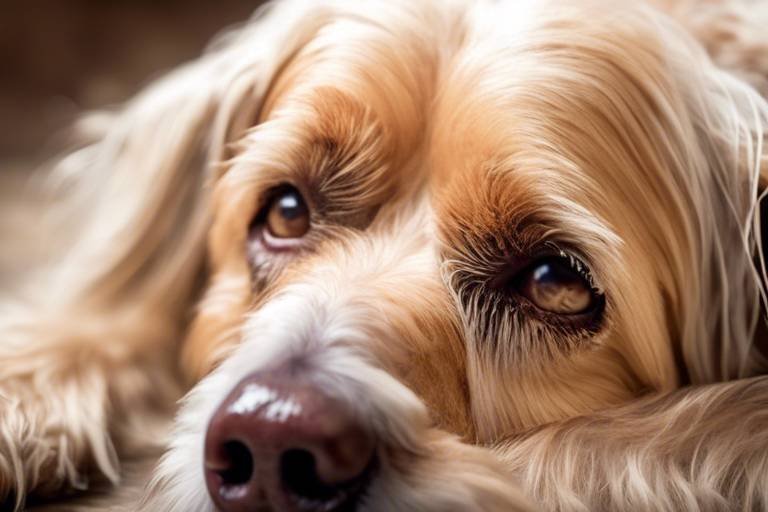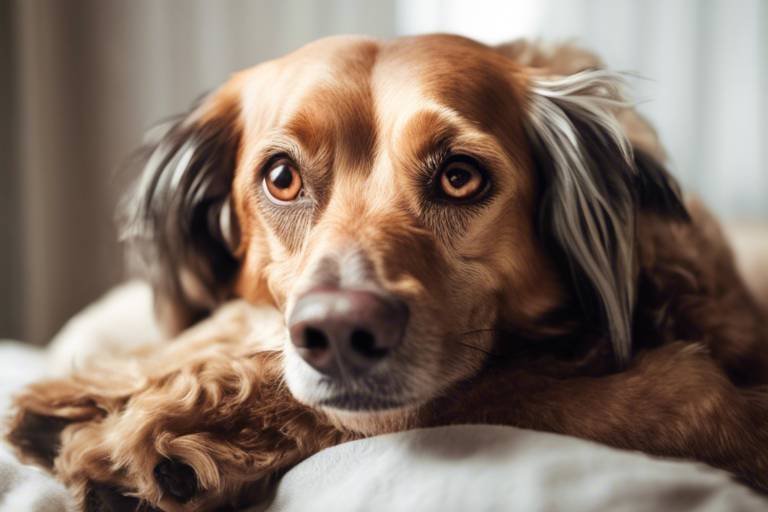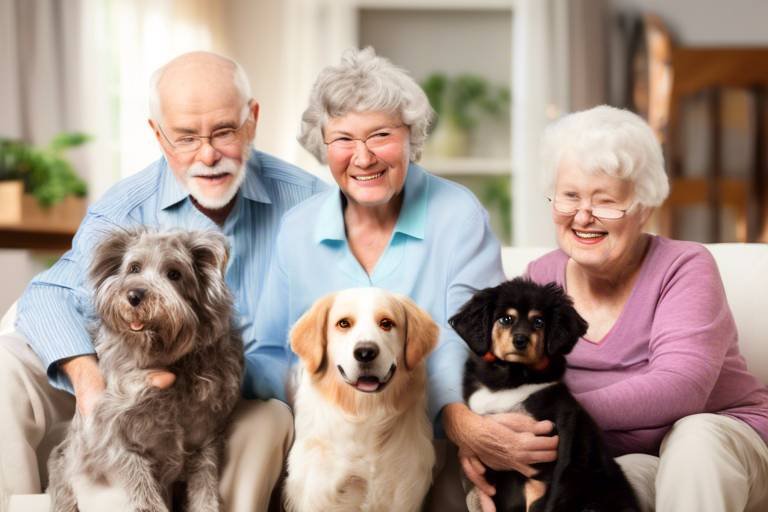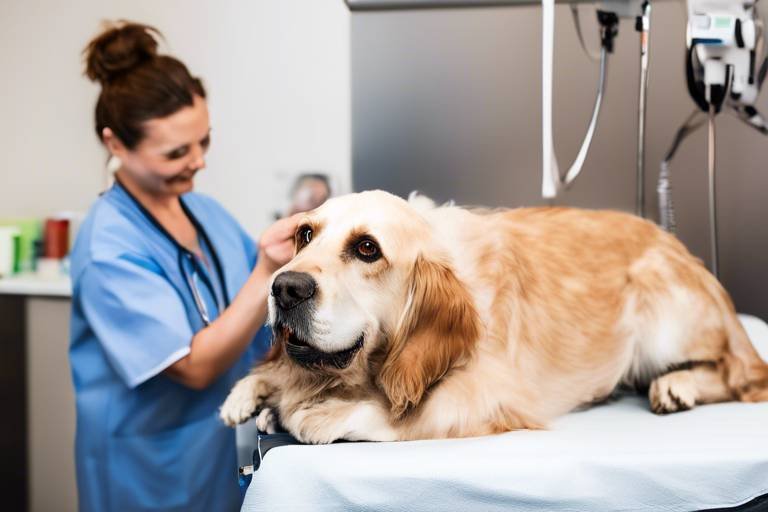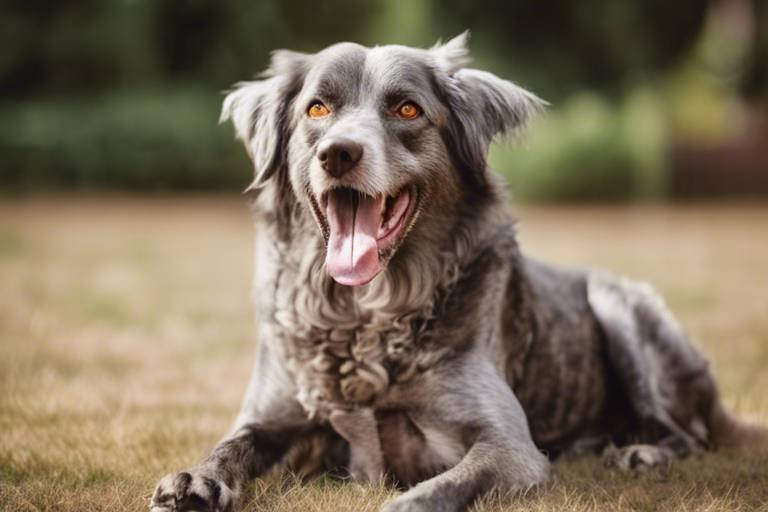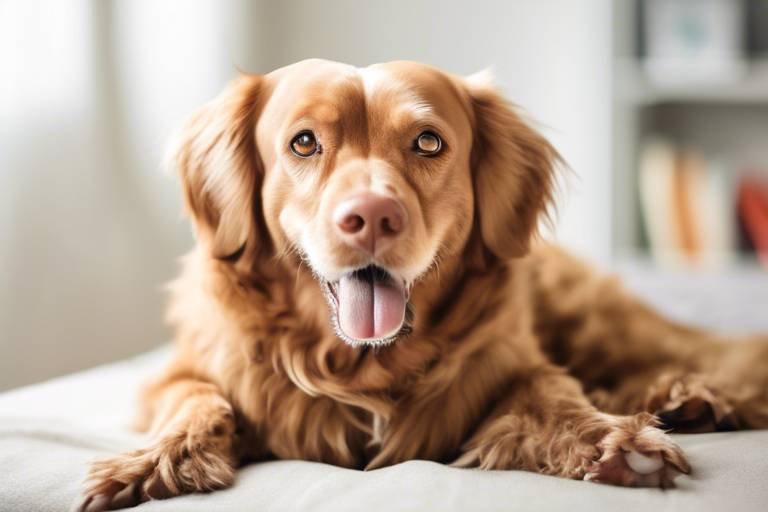How to Help Your Senior Dog with Incontinence
As our furry friends age, they may face various health issues, one of which is incontinence. This condition can be particularly challenging for both dogs and their owners, but understanding how to manage it can significantly improve your senior dog's quality of life. Incontinence can lead to discomfort, anxiety, and even a sense of shame for your beloved pet. So, what can you do to help? In this article, we’ll explore effective strategies and practical tips to ensure your senior dog remains happy and comfortable, despite the challenges of incontinence.
Incontinence in dogs can stem from a variety of causes. As dogs age, their bodies undergo changes that can affect bladder control. This can be due to age-related changes, medical conditions such as urinary tract infections, or hormonal imbalances like those seen in spayed females. Understanding these factors is crucial for effective management and treatment options. For instance, if a senior dog has developed incontinence, it might not just be a sign of aging but could also indicate an underlying health issue that needs to be addressed. By recognizing the root cause, you can take appropriate steps to help your furry friend.
Recognizing the signs of incontinence early can lead to timely interventions. Common indicators include:
- Frequent urination, especially in unusual places
- Wet bedding or spots on the floor
- Unusual odors that may indicate urine leakage
If you notice any of these signs, it’s essential to investigate further. Early detection can help you intervene before the situation worsens, ensuring your dog remains comfortable and stress-free.
Incontinence can lead to noticeable behavioral changes in dogs. You might observe increased anxiety, reluctance to engage in activities, or even signs of depression. Imagine how you would feel if you were unable to control your bladder—this is the reality for many senior dogs experiencing incontinence. Addressing these behavioral issues is essential for maintaining a happy and healthy pet. Providing a safe and comfortable environment where your dog feels secure can help alleviate some of the anxiety associated with this condition.
Incontinence can significantly affect a dog's quality of life. It can lead to discomfort, stress, and a sense of shame, which can be tough for both the pet and the owner. Understanding this impact helps owners take necessary steps to improve their dog's well-being. Ensuring your dog has a clean, dry space to rest and play can make a world of difference. Additionally, providing emotional support through gentle reassurances can help your dog cope with this challenging condition.
As a pet owner, your role is pivotal in supporting your senior dog through incontinence. Providing comfort, reassurance, and proper care can alleviate stress for both the dog and the owner. Regularly checking your dog’s bedding and keeping their living area clean can prevent infections and promote a healthier environment. Moreover, consider consulting with your veterinarian about the best products to help manage incontinence, like doggie diapers or waterproof bedding.
Various medical treatments are available to manage incontinence in senior dogs. These include medications that can help strengthen the bladder muscles or surgical options for more severe cases. Consulting with a veterinarian is essential to find the best course of action tailored to your dog's specific needs. Regular check-ups can also help monitor their condition and adjust treatments as necessary.
Implementing home care solutions can greatly assist in managing incontinence. Simple adjustments can make a significant difference in your dog’s comfort and hygiene. For instance, using doggie diapers can help contain leaks and keep your home clean. Waterproof bedding is another smart investment, allowing your dog to rest comfortably without the worry of wet spots. Additionally, consider setting up a designated bathroom area outdoors to encourage your dog to relieve themselves in a specific spot.
Dietary changes can also influence bladder health in dogs. A balanced diet rich in fiber and hydration can help reduce incontinence symptoms and promote overall well-being. Foods that are high in moisture, like wet dog food or adding water to dry kibble, can aid in maintaining a healthy urinary tract. Always consult with your veterinarian before making significant dietary changes to ensure they are appropriate for your senior dog’s health.
Regular veterinary check-ups are crucial for monitoring your senior dog's health. These visits allow for early detection of potential issues and adjustments to treatment plans as needed. Keeping an open line of communication with your vet ensures that you are equipped with the best information and resources to support your furry friend effectively.
Q: What are the common causes of incontinence in senior dogs?
A: Common causes include age-related changes, urinary tract infections, hormonal imbalances, and certain medications.
Q: How can I tell if my dog is experiencing incontinence?
A: Signs include frequent urination, wet bedding, unusual odors, and behavioral changes such as anxiety or reluctance to engage in activities.
Q: Are there specific diets that can help manage incontinence?
A: Yes, a balanced diet rich in fiber and hydration can help support bladder health and reduce incontinence symptoms.
Q: When should I consult a veterinarian about my dog's incontinence?
A: If you notice any signs of incontinence or if your dog's behavior changes significantly, it’s best to consult your veterinarian for advice and potential treatment options.

Understanding Canine Incontinence
Incontinence in dogs is a condition that can be both challenging and distressing, not just for the furry friends but also for their loving owners. As our dogs age, their bodies undergo various changes that can lead to incontinence. This condition can stem from a multitude of causes, and understanding these factors is crucial for effective management and treatment options.
One of the most common reasons for incontinence in senior dogs is age-related changes in the bladder and urinary tract. Just like humans, dogs experience a decline in muscle tone and elasticity as they grow older. This can lead to a weakened bladder that struggles to hold urine, resulting in unexpected leaks. Additionally, certain medical conditions, such as urinary tract infections or bladder stones, can exacerbate incontinence issues. It’s important to note that hormonal imbalances, particularly in spayed females, can also play a significant role in urinary incontinence.
To better illustrate the causes of canine incontinence, consider the following table:
| Cause | Description |
|---|---|
| Age-Related Changes | Loss of muscle tone and elasticity in the bladder due to aging. |
| Medical Conditions | Issues like urinary tract infections or bladder stones that can lead to incontinence. |
| Hormonal Imbalances | Hormonal changes, especially in spayed females, can lead to loss of bladder control. |
Recognizing these underlying causes is the first step in addressing the issue. If your senior dog is showing signs of incontinence, it’s essential to consult with a veterinarian who can help diagnose the problem accurately. They may recommend various tests, including urinalysis or imaging studies, to determine the exact cause of the incontinence.
Moreover, understanding incontinence is not just about the physical aspects. It’s also about the emotional and psychological impacts on both the dog and the owner. Dogs may experience anxiety or stress due to their inability to control their bladder, which can lead to behavioral changes. As a pet owner, being aware of these factors allows you to provide the necessary support and care to help your furry friend through this challenging time.
In conclusion, understanding canine incontinence involves recognizing the various causes and their implications on your dog’s health and well-being. By being informed and proactive, you can make a significant difference in your senior dog's quality of life.

Signs of Incontinence in Dogs
Recognizing the signs of incontinence in your furry friend is crucial for timely intervention and management. It's not just about noticing a puddle on the floor; there are subtle clues that can indicate a deeper issue. For instance, if you find your dog urinating more frequently than usual, or if they seem to be straining to go, these could be red flags. Additionally, keep an eye out for wet bedding or spots on your carpets, as these are often tell-tale signs that your dog may be struggling with incontinence.
But it doesn't stop there. Sometimes, the signs can be more behavioral than physical. You might notice your senior dog becoming anxious or reluctant to engage in activities they once loved. This change in behavior can stem from embarrassment or discomfort associated with their condition. It's essential to approach these signs with empathy and understanding. After all, your dog relies on you to interpret their needs and provide the support they require.
Here are some common indicators of incontinence to watch for:
- Frequent Urination: If your dog is asking to go out more often, this could be a sign of incontinence.
- Wet Bedding: Finding your dog's bed damp or wet can indicate that they are unable to control their bladder.
- Unusual Odors: Noticeable odors in your home can be a strong indicator that your dog is experiencing incontinence.
- Straining or Hesitation: If your dog seems to struggle when trying to urinate, it may be a sign of an underlying issue.
It's essential to approach these signs with a proactive mindset. Early detection can lead to more effective management strategies, which can significantly improve your dog's quality of life. If you notice any of these signs, don't hesitate to consult with your veterinarian. They can help you determine the underlying cause of the incontinence and suggest appropriate treatment options.
| Sign | Description |
|---|---|
| Frequent Urination | Your dog may need to go out more often than usual. |
| Wet Bedding | Finding your dog's bed soaked can indicate they are losing control. |
| Unusual Odors | Persistent smells in your home may suggest incontinence. |
| Straining | Your dog may appear to struggle when trying to urinate. |
In conclusion, being vigilant about these signs can make a world of difference for your senior dog. Remember, you are their advocate, and your attention to their needs is paramount. By being proactive and responsive, you can help your furry friend navigate this challenging phase of their life with dignity and comfort.
Q: What should I do if I suspect my dog has incontinence?
A: Consult your veterinarian for a thorough examination and appropriate treatment options.
Q: Are there specific breeds more prone to incontinence?
A: While any dog can experience incontinence, certain breeds may be more susceptible due to genetic factors.
Q: Can incontinence be managed with lifestyle changes?
A: Yes, adjustments such as diet, exercise, and home care solutions can significantly help manage the condition.
Behavioral Changes
When our beloved senior dogs start experiencing incontinence, it’s not just their physical health that takes a hit; their can be just as concerning. Imagine how you would feel if you suddenly lost control over your bodily functions—anxiety, embarrassment, and confusion would likely swirl around in your mind. Our furry friends often mirror these emotions, leading to noticeable shifts in their behavior. You might find your once-playful pup becoming more withdrawn, hesitant to engage in activities they once loved. This change can be heartbreaking for any pet owner.
One of the most common behavioral changes is an increase in anxiety. Dogs may feel stressed about potential accidents, leading them to avoid situations where they might not be able to control their urges. For example, a dog that used to eagerly greet visitors at the door might now retreat to a quiet corner. This shift not only affects their happiness but can also strain the bond you share. It’s essential to recognize that these changes are not just quirks; they are signs of distress.
Additionally, you might observe a reluctance to go outside. Many dogs associate outdoor time with relief, but if they’re struggling with incontinence, they may hesitate to venture out, fearing they won’t make it back in time. This can lead to a vicious cycle: less outdoor time can contribute to further anxiety and behavioral issues, such as destructive behavior or excessive barking.
To help your senior dog cope with these challenges, consider implementing a few strategies:
- Reassurance: Provide plenty of comfort and encouragement. Simple words of affirmation can go a long way in helping your dog feel secure.
- Routine: Establish a consistent daily schedule for bathroom breaks. This predictability can reduce anxiety and help your dog feel more in control.
- Safe Spaces: Create a cozy, safe area in your home where your dog can retreat when feeling overwhelmed.
By being proactive and observant, you can address these behavioral changes head-on. Remember, your dog relies on you for support and understanding during this challenging time. With the right approach, you can help them navigate their new reality, ensuring that their golden years are filled with love, comfort, and joy.
Q1: How can I tell if my dog is experiencing incontinence?
A1: Look for signs such as frequent urination, wet spots on bedding, or changes in behavior like increased anxiety or reluctance to engage in activities.
Q2: Are there specific breeds more prone to incontinence?
A2: While any dog can experience incontinence, certain breeds, especially larger ones, may be more susceptible due to anatomical or hormonal factors.
Q3: Can dietary changes help with my dog's incontinence?
A3: Yes, a balanced diet that promotes bladder health can be beneficial. Consult your vet for tailored dietary recommendations.
Q4: When should I consult a veterinarian about my dog's incontinence?
A4: If you notice any signs of incontinence, it’s best to consult a veterinarian as soon as possible to determine the underlying cause and discuss treatment options.
Impact on Quality of Life
Incontinence in senior dogs can have a profound impact on their quality of life. Imagine being unable to control your bodily functions; it can lead to feelings of embarrassment and anxiety. For our furry companions, this condition can manifest in various ways, affecting not only their physical health but also their emotional well-being. Dogs are creatures of habit, and any disruption to their routine can cause stress and discomfort.
When a dog experiences incontinence, it might shy away from social interactions, avoiding playtime or cuddles due to the fear of accidents. This behavioral shift can be heartbreaking for pet owners who cherish those moments of connection. The constant worry about having accidents can lead to increased anxiety in dogs, and they may exhibit signs of distress, such as pacing or whining. It’s essential to recognize that these behavioral changes are not just nuisances; they are cries for help from our beloved pets.
Furthermore, the physical discomfort associated with incontinence can lead to other health issues, such as skin irritations or urinary tract infections. This cascade of problems can create a vicious cycle, where the dog becomes less active due to discomfort, leading to weight gain and further health complications. Thus, the impact of incontinence extends beyond the immediate symptoms, affecting the overall welfare of the dog.
To truly understand the impact of incontinence, consider the following factors:
- Emotional Distress: Dogs are sensitive creatures. The inability to control their bladder can lead to feelings of shame and isolation.
- Social Withdrawal: As mentioned, dogs may withdraw from social interactions, which can affect their bond with family members.
- Physical Health Risks: Incontinence can lead to skin infections and other health complications, which can be painful and require additional treatment.
As pet owners, it’s our responsibility to recognize these changes and take action. By providing a supportive environment, we can help our dogs navigate this challenging phase of life. Simple adjustments, such as creating a comfortable space for them to rest and relax, can make a world of difference. Additionally, using protective bedding or doggie diapers can alleviate some of the stress associated with incontinence, allowing our furry friends to feel more secure and comfortable in their own homes.
Ultimately, understanding the impact of incontinence on a senior dog's quality of life is crucial for effective management. It allows pet owners to take proactive steps to improve their dog's well-being and ensure that they continue to lead happy, fulfilling lives despite the challenges they face.
1. What are the common causes of incontinence in senior dogs?
Incontinence in senior dogs can be caused by age-related changes, hormonal imbalances, urinary tract infections, or even certain medications. It's essential to consult with a veterinarian for a proper diagnosis.
2. How can I help my dog feel more comfortable with incontinence?
You can help your dog by providing a comfortable, clean space, using doggie diapers, and ensuring they have frequent bathroom breaks. Additionally, maintaining a consistent routine can help them feel more secure.
3. Are there any dietary changes that can help with incontinence?
Yes, a balanced diet rich in fiber and hydration can support bladder health and potentially reduce incontinence symptoms. Always consult your vet before making significant dietary changes.
4. When should I consult a veterinarian about my dog's incontinence?
If you notice any signs of incontinence, such as frequent urination or wet bedding, it's best to consult your veterinarian as soon as possible. Early intervention can lead to better management options.
Owner's Role in Support
As a devoted pet owner, your role in supporting your senior dog with incontinence is absolutely crucial. Imagine being in your dog's paws, feeling confused and uncomfortable due to an uncontrollable urge to relieve themselves. It’s not just a physical issue; it can be mentally taxing too! By taking a proactive approach, you can significantly enhance your furry friend's quality of life. First and foremost, empathy is key. Understand that your dog may feel embarrassed or anxious about their condition. Your response can help them feel safe and loved, which is essential for their emotional well-being.
Providing a comfortable environment is another vital aspect of your support. This can include creating a designated bathroom area that is easily accessible, especially if your dog has mobility issues. Consider using doggie diapers or pads to prevent accidents around the house. It’s not just about cleanliness; it’s about maintaining dignity. Dogs are creatures of habit, so establishing a consistent routine for bathroom breaks can help them feel more secure. Remember, your patience and understanding during this time can foster a trusting relationship, making your dog feel more at ease.
Moreover, regular positive reinforcement is essential. When your dog successfully uses the designated area or shows signs of improvement, reward them with treats or praise. This not only encourages good behavior but also boosts their confidence. Furthermore, keeping an open line of communication with your veterinarian is vital. They can provide insights into your dog’s condition and suggest tailored strategies for support. By staying informed, you can make the best decisions for your senior pet’s care.
Finally, don’t underestimate the power of self-care for yourself as an owner. Caring for a pet with incontinence can be challenging and may lead to feelings of frustration or helplessness. It’s important to take breaks and seek support from fellow pet owners or online communities. Sharing your experiences can provide you with new strategies and emotional relief. Remember, a happy owner leads to a happy pet!
- What are the common causes of incontinence in senior dogs?
Incontinence in senior dogs can be caused by a variety of factors including age-related changes, urinary tract infections, hormonal imbalances, or other underlying medical conditions. - How can I tell if my dog is experiencing incontinence?
Look for signs such as frequent urination, wet spots on bedding, unusual odors, or changes in behavior such as anxiety or reluctance to play. - Are there specific diets that can help with my dog's incontinence?
A balanced diet that is rich in fiber and hydration can support bladder health and potentially reduce incontinence symptoms. - When should I consult a veterinarian?
If you notice any signs of incontinence or behavioral changes in your dog, it’s important to consult a veterinarian to determine the underlying cause and appropriate treatment.
Medical Treatments Available
When it comes to managing incontinence in senior dogs, there are several medical treatments that can make a world of difference. It's essential to consult with your veterinarian to determine the best course of action tailored to your furry friend’s specific needs. The treatment options can range from medications to surgical interventions, depending on the underlying cause of the incontinence.
One of the most common medications prescribed is phenylpropanolamine, which helps tighten the bladder sphincter, reducing leakage. This medication has been found effective for many dogs, but like all medications, it may come with potential side effects, such as increased heart rate or restlessness. It's crucial to monitor your dog closely and communicate any concerns with your vet.
Another option is the use of hormonal therapies. For female dogs, estrogen can sometimes be used to help strengthen the urethral sphincter. Similarly, for male dogs, testosterone supplements might be recommended. However, these treatments might not be suitable for all dogs, especially those with certain medical conditions.
In some cases, if medications fail to provide relief, surgical options may be considered. Procedures such as collagen injections or surgical implants can help support the bladder and reduce incontinence. These are generally reserved for more severe cases and require a thorough discussion with your vet about the risks and benefits involved.
To give you a clearer overview, here’s a table summarizing the common medical treatments for canine incontinence:
| Treatment Type | Description | Considerations |
|---|---|---|
| Medications | Phenylpropanolamine, estrogen therapy | May have side effects; requires vet supervision |
| Surgical Options | Collagen injections, bladder support surgery | More invasive; thorough vet consultation needed |
Ultimately, the key to effectively managing your senior dog's incontinence is to maintain open communication with your veterinarian. Regular check-ups will allow for timely adjustments to the treatment plan, ensuring your furry companion remains as comfortable and happy as possible.
As we navigate this journey together, remember that patience and understanding are essential. Your senior dog may face challenges, but with the right medical support and care, you can enhance their quality of life significantly.
- What are the first signs of incontinence in dogs? Look for frequent urination, wet bedding, or unusual odors.
- Can incontinence be treated? Yes, with proper medical treatment and care, many dogs can manage their symptoms effectively.
- Is surgery always necessary for incontinence? No, many cases can be managed with medications. Surgery is typically a last resort.
- How can I help my dog feel more comfortable at home? Consider using doggie diapers and waterproof bedding to manage accidents.
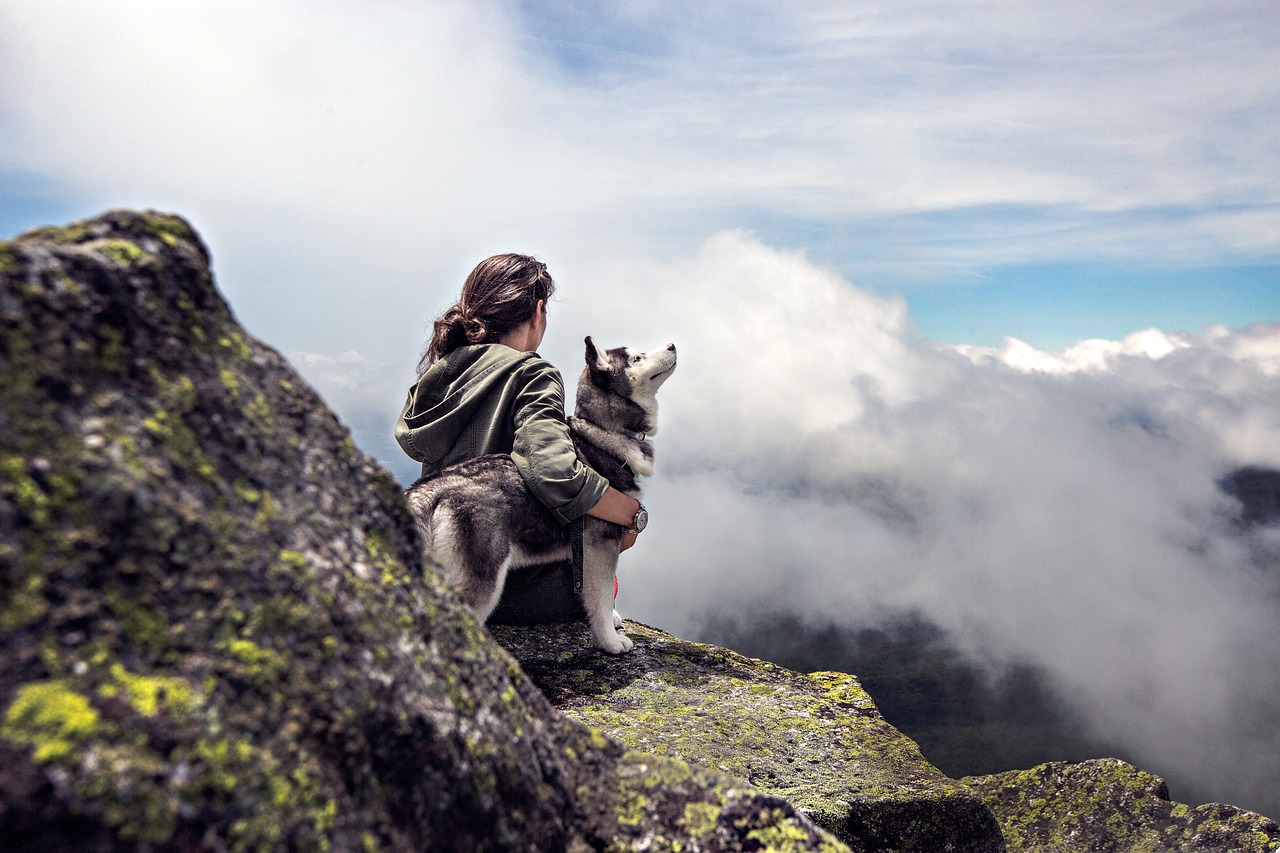
Home Care Solutions
Managing incontinence in senior dogs can seem like a daunting task, but with the right home care solutions, you can significantly improve your furry friend's comfort and quality of life. One of the first steps is to create a comfortable and accessible environment for your dog. This means ensuring that their sleeping area is easy to access and that they have a designated spot for bathroom breaks. Consider using doggie diapers or pads, which can be an excellent temporary solution to manage accidents and keep your home clean. These products come in various sizes and styles, making it easier to find the right fit for your dog.
Additionally, investing in waterproof bedding can help protect your dog's sleeping area from unwanted messes. Look for options that are easy to clean and maintain, as this will save you time and effort in the long run. Regularly washing their bedding will not only keep the area hygienic but also help eliminate any lingering odors. Remember, a clean and fresh environment contributes to your dog's overall well-being.
Another practical solution involves creating a consistent bathroom schedule. By taking your dog out at regular intervals, you can help them relieve themselves before accidents occur. Pay attention to your dog's natural rhythms—most dogs need to go out after meals, naps, or playtime. Establishing a routine can help reduce anxiety for both you and your pet, as they will know when to expect their bathroom breaks.
Diet also plays a crucial role in managing incontinence. Ensuring your senior dog has a balanced diet rich in fiber can promote healthy bowel movements and reduce the frequency of urinary accidents. Make sure they have access to fresh water at all times, as proper hydration supports overall bladder health. Consult with your veterinarian about any dietary changes you’re considering, as they can provide tailored advice based on your dog’s specific needs.
To further enhance your home care strategy, consider setting up a designated bathroom area in your yard or home. This space should be easily accessible and familiar to your dog. You might even want to use a specific command when taking them out to help reinforce the behavior. Over time, this can create positive associations and make bathroom breaks more routine.
Finally, don't underestimate the importance of emotional support. Incontinence can be stressful for both dogs and their owners. Providing your senior dog with extra love, attention, and reassurance can help ease their anxiety. Engage in gentle play or offer treats to create positive experiences, helping your dog feel secure and valued despite their challenges.
Here are some common questions pet owners have regarding managing incontinence in senior dogs:
- What are the signs that my dog is experiencing incontinence? Look for frequent urination, wet spots on bedding, or unusual odors.
- Are doggie diapers effective? Yes, they can be a great temporary solution to manage accidents.
- Can diet affect my dog's incontinence? Absolutely! A balanced diet can help support bladder health.
- How often should I take my dog out for bathroom breaks? Establish a routine based on your dog's natural habits, typically after meals and naps.
- When should I consult a veterinarian? If you notice sudden changes in your dog’s bathroom habits or if incontinence worsens, it’s time to seek professional advice.
Dietary Adjustments
This article explores effective strategies to manage incontinence in senior dogs, providing pet owners with practical tips and insights to improve their furry friends' quality of life.
Incontinence in dogs can stem from various causes, including age-related changes, medical conditions, or hormonal imbalances. Understanding these factors is crucial for effective management and treatment options.
Recognizing the signs of incontinence early can lead to timely interventions. Common indicators include frequent urination, wet bedding, and unusual odors, which warrant further investigation.
Incontinence can lead to behavioral changes in dogs, such as increased anxiety or reluctance to engage in activities. Addressing these behavioral issues is essential for maintaining a happy and healthy pet.
Incontinence can significantly affect a dog's quality of life, leading to discomfort and stress. Understanding this impact helps owners take necessary steps to improve their dog's well-being.
Pet owners play a vital role in supporting their senior dogs through incontinence. Providing comfort, reassurance, and proper care can alleviate stress for both the dog and the owner.
Various medical treatments are available to manage incontinence in senior dogs, including medications and surgical options. Consulting with a veterinarian is essential to find the best course of action.
Implementing home care solutions can greatly assist in managing incontinence. Simple adjustments, such as using doggie diapers or waterproof bedding, can make a significant difference.
Dietary changes can have a profound effect on your senior dog's bladder health. Just like humans, dogs benefit from a well-balanced diet that supports their overall well-being. A diet rich in fiber can help regulate bowel movements, which in turn may alleviate some pressure on the bladder. Additionally, ensuring your dog stays well-hydrated is crucial. Water plays a vital role in flushing out toxins and can help maintain a healthy urinary tract.
When considering dietary adjustments, it's essential to focus on high-quality dog food that lists meat as the first ingredient, as protein is vital for muscle maintenance, including the muscles that support bladder control. You might also want to consider adding natural supplements, such as:
- Cranberry extract - known for its ability to promote urinary tract health.
- Probiotics - they can help balance the gut flora, which may indirectly support bladder function.
- Omega-3 fatty acids - these can reduce inflammation and promote overall health.
It's also a good idea to consult with your veterinarian before making any significant changes to your dog's diet. They can provide tailored advice that takes your dog's specific needs and health conditions into account. Remember, just like we have our comfort foods, dogs may have preferences too! Gradually introducing new foods can help you avoid upsetting their stomachs.
Lastly, keeping a consistent feeding schedule can help regulate your dog's bathroom habits. By feeding them at the same times each day, you can better predict when they'll need to go outside, making it easier to manage incontinence.
Regular veterinary check-ups are crucial for monitoring your senior dog's health. These visits allow for early detection of potential issues and adjustments to treatment plans as needed.
Incontinence in senior dogs can be caused by a variety of factors, including age-related muscle weakening, urinary tract infections, hormonal imbalances, or underlying health conditions such as diabetes.
Signs of incontinence often include frequent urination, wet spots on bedding, unusual odors, or your dog displaying signs of discomfort or anxiety when trying to relieve themselves.
Yes, a diet rich in fiber, high-quality proteins, and adequate hydration can support bladder health. Foods with added supplements, like cranberry extract and omega-3 fatty acids, can also be beneficial.
If you notice any signs of incontinence or behavioral changes in your dog, it's essential to consult your veterinarian. They can help identify the underlying cause and recommend appropriate treatments.
Regular Vet Check-ups
This article explores effective strategies to manage incontinence in senior dogs, providing pet owners with practical tips and insights to improve their furry friends' quality of life.
Incontinence in dogs can stem from various causes, including age-related changes, medical conditions, or hormonal imbalances. Understanding these factors is crucial for effective management and treatment options.
Recognizing the signs of incontinence early can lead to timely interventions. Common indicators include frequent urination, wet bedding, and unusual odors, which warrant further investigation.
Incontinence can lead to behavioral changes in dogs, such as increased anxiety or reluctance to engage in activities. Addressing these behavioral issues is essential for maintaining a happy and healthy pet.
Incontinence can significantly affect a dog's quality of life, leading to discomfort and stress. Understanding this impact helps owners take necessary steps to improve their dog's well-being.
Pet owners play a vital role in supporting their senior dogs through incontinence. Providing comfort, reassurance, and proper care can alleviate stress for both the dog and the owner.
Various medical treatments are available to manage incontinence in senior dogs, including medications and surgical options. Consulting with a veterinarian is essential to find the best course of action.
Implementing home care solutions can greatly assist in managing incontinence. Simple adjustments, such as using doggie diapers or waterproof bedding, can make a significant difference.
Dietary changes can influence bladder health in dogs. A balanced diet, rich in fiber and hydration, can help reduce incontinence symptoms and promote overall well-being.
Regular veterinary check-ups are crucial for monitoring your senior dog's health. These visits allow for early detection of potential issues and adjustments to treatment plans as needed. Think of it as a routine pit stop for your furry friend—just like a car needs regular maintenance to run smoothly, so does your dog! During these check-ups, your vet will assess your dog's overall health, paying special attention to any signs of incontinence. This proactive approach can lead to timely interventions that make a world of difference.
Moreover, establishing a routine for vet visits can help you stay on top of your dog's health. Here are some key aspects that should be covered during these appointments:
- Physical Examination: Your vet will conduct a thorough physical exam to check for any abnormalities.
- Urinalysis: This test can help identify infections, crystals, or other underlying issues affecting your dog's bladder.
- Blood Work: Regular blood tests can reveal kidney function and other vital health indicators.
- Medication Review: If your dog is on medication, this is the perfect time to discuss its effectiveness and any side effects.
By prioritizing these check-ups, you can ensure that your senior dog receives the best possible care. It's not just about treating incontinence; it's about enhancing your dog's overall quality of life. After all, a happy dog means a happy owner!
Q1: How often should I take my senior dog to the vet?
A: It's generally recommended to take your senior dog for a check-up at least twice a year. However, if your dog has specific health issues, your vet may suggest more frequent visits.
Q2: Are there specific diets that can help with incontinence?
A: Yes! Diets that are high in fiber and hydration can assist in managing incontinence. Always consult your vet for tailored dietary recommendations.
Q3: Can incontinence be cured?
A: While some cases of incontinence can be treated effectively, others may require ongoing management. Your vet will help you determine the best course of action.
Frequently Asked Questions
- What causes incontinence in senior dogs?
Incontinence in senior dogs can be caused by several factors, including age-related changes, hormonal imbalances, urinary tract infections, or underlying medical conditions. It's essential to consult with a veterinarian to determine the specific cause for effective management.
- How can I tell if my dog is incontinent?
Look for signs such as frequent urination, wet spots on bedding, unusual odors, or if your dog seems to be straining to urinate. If you notice these symptoms, it's a good idea to schedule a vet visit for further evaluation.
- Are there behavioral changes associated with incontinence?
Yes, incontinence can lead to increased anxiety or changes in behavior, such as reluctance to play or go for walks. Dogs may feel embarrassed or stressed about their condition, so providing reassurance and comfort is crucial.
- What can I do at home to help my incontinent dog?
Implementing home care solutions like using doggie diapers, waterproof bedding, and frequent bathroom breaks can help manage incontinence. Additionally, creating a comfortable environment can ease your dog's stress.
- Are there medical treatments available for canine incontinence?
Yes, there are various medical treatments, including medications and surgical options. It's important to work closely with your veterinarian to determine the best treatment plan tailored to your dog's needs.
- How can dietary changes help with incontinence?
A balanced diet that includes adequate hydration and fiber can support bladder health and may help reduce incontinence symptoms. Consulting with your vet about dietary adjustments can be beneficial.
- How often should I take my senior dog to the vet?
Regular vet check-ups are critical for senior dogs, ideally every six months. These visits allow for monitoring health changes and adjusting treatment plans as necessary to ensure your dog's well-being.

